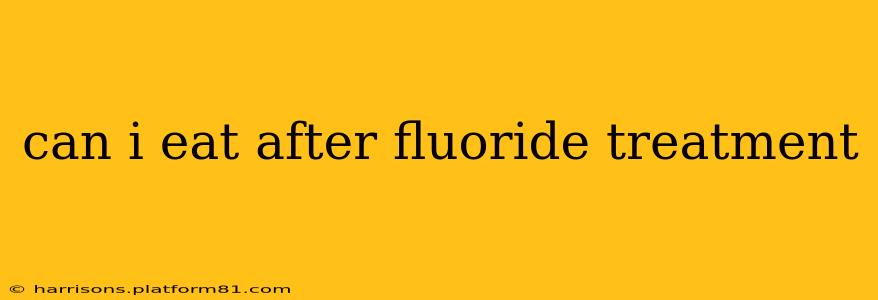Fluoride treatments are a common preventative measure in dentistry, designed to strengthen tooth enamel and protect against cavities. But after undergoing a fluoride treatment, a common question arises: can I eat after the treatment? The short answer is: it depends. This guide will delve into the specifics, helping you understand the nuances of post-treatment care and ensuring optimal results from your fluoride application.
What Happens During a Fluoride Treatment?
Before addressing the eating question, let's briefly review the fluoride treatment process. There are various types, including professional in-office treatments and at-home applications. Professional treatments usually involve a gel, foam, or varnish applied directly to the teeth. These formulations contain a higher concentration of fluoride than what's found in toothpaste. The fluoride works by strengthening the enamel, making it more resistant to acid attacks from bacteria and sugars.
Can I Eat or Drink Immediately After a Fluoride Treatment?
This is where the "it depends" comes into play. The recommendation often hinges on the type of fluoride treatment you received:
Professional In-Office Treatments:
Generally, after a professional fluoride treatment (gel, foam, or varnish), dentists advise waiting at least 30 minutes before eating or drinking anything. This allows sufficient time for the fluoride to fully absorb into the tooth enamel. Consuming anything too soon could wash away the treatment, diminishing its effectiveness. Avoid acidic drinks and foods as much as possible in this timeframe, too.
At-Home Fluoride Treatments:
At-home fluoride treatments, like fluoride mouthwashes or toothpastes, usually don’t have the same stringent restrictions. However, it's still advisable to wait about 30 minutes before eating or drinking anything too acidic.
What Should I Avoid After a Fluoride Treatment?
Regardless of the type of treatment, certain foods and beverages should be avoided immediately following the procedure:
- Acidic Foods and Drinks: These include citrus fruits, sodas, juices, and tomatoes. Acids can neutralize the fluoride and potentially erode the enamel.
- Sticky or Sugary Foods: These can adhere to the teeth and interfere with the fluoride’s absorption.
- Hot Foods and Drinks: These could cause discomfort or sensitivity after treatment.
- Alcohol: Alcohol can also have a negative effect on the fluoride absorption and the overall health of your teeth and gums.
What Can I Eat After a Fluoride Treatment?
After the recommended waiting period, you can resume your normal diet. However, prioritizing a healthy diet is always beneficial for maintaining good oral hygiene. Focus on nutrient-rich foods that support strong teeth and gums. This includes plenty of fruits and vegetables, whole grains, and lean proteins.
How Long Does the Fluoride Treatment Last?
The duration of a fluoride treatment's effect varies depending on the type and concentration of fluoride used. Generally, the benefits can last for several months, but regular dental checkups and good oral hygiene practices are crucial for long-term protection.
How Often Should I Get a Fluoride Treatment?
The frequency of fluoride treatments is determined by your dentist based on your individual needs and risk factors for cavities. Some individuals may benefit from more frequent treatments, while others may only require them occasionally.
Can I Brush My Teeth After a Fluoride Treatment?
You might be able to brush your teeth soon after a fluoride treatment, depending on the type and your dentist's recommendations. Generally, you should wait for the recommended timeframe (around 30 minutes) to allow absorption before brushing.
Conclusion: Prioritize Proper Post-Treatment Care
Following your dentist's instructions meticulously is key to maximizing the benefits of your fluoride treatment. By understanding the "dos and don'ts" of post-treatment care, you can significantly improve the effectiveness of the treatment and protect your teeth from cavities. Remember, maintaining good oral hygiene is always a vital complement to professional fluoride treatments. Regular brushing, flossing, and dental check-ups contribute to a healthy, beautiful smile.
